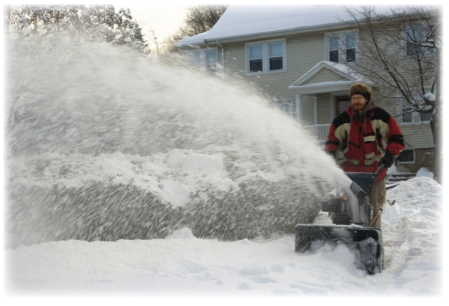Most of your landscaping goes into a dormant period over the cold months of winter, covered by a nice blanket of snow. But when that blanket coats your driveway and walkways, something needs to be done for safety. Follow these snow removal tips and be sure to protect your garden from damage during the winter season.

# 1 – Direct Snow Away From Tender Plants
Whether you use a snow blower or hire a snow removal firm to take care of your property, make sure the excess snow is directed away from tender plants in your garden and landscape. Tiny ice crystals can nick and tear away at stems, foliage and bark, leaving prized plants damaged beyond repair.
Spray, blow or push the snow into the turf, or protect your garden and trees with a physical barrier. Snow fences or snow blankets work well on your perennial gardens and burlap wraps protect bark on young or tender trees. Invest in these small tools to take the bite out of snow thrown into your landscape by blowers and plows.
# 2 – Use a Better De-Icing Solution
Although salt melts ice quickly, a build up of salt in your soil, turf and garden will create havoc. Many municipalities across Massachusetts have warned against using salt as a de-icing solution, attempting to maintain better water quality.
Products with calcium chloride tend to cost a little more, but they're also gentler on your landscape. Some homeowners also opt for simple sand, offering traction over the ice. Sand can either be swept away in the spring or mixed into your soil with very little effect on your plants.
Be careful of your plants this winter. In order for them to weather the season well, you need to protect them from harmful ice pellets and the corrosive effects of excessive salt. Talk to your snow removal contractor about other ways you can protect the grass and garden and let your landscape have a well earned rest this winter.

 781-646-5555
781-646-5555